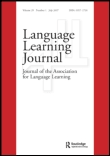
Language Learning Journal
Scope & Guideline
Connecting scholars to the latest in linguistics and education.
Introduction
Aims and Scopes
- Language Acquisition Processes:
Research exploring how learners acquire second languages, including cognitive, emotional, and social factors that influence language learning outcomes. - Language Pedagogy and Teaching Practices:
Studies examining innovative teaching methodologies, assessment techniques, and curriculum development aimed at enhancing language education in various contexts. - Multilingualism and Identity:
Investigations into how multilingual identities are formed, negotiated, and maintained within educational settings, focusing on the implications for teaching and learning. - Technology in Language Learning:
Exploration of the role of digital tools and online learning environments in facilitating language acquisition, including the impact of educational technologies on learner engagement. - Cultural and Contextual Influences:
Research on how cultural backgrounds and contextual factors shape language learning experiences and outcomes, emphasizing the importance of context in language education.
Trending and Emerging
- Emotional and Psychological Aspects of Learning:
Increasing research on the emotional experiences of learners, including anxiety, motivation, and identity, highlights the importance of addressing psychological factors in language education. - Digital and Online Learning Environments:
The rise of online learning due to the COVID-19 pandemic has led to a significant focus on digital tools and their effectiveness in language learning, marking a shift towards more technology-driven pedagogies. - Intercultural Communication and Exchange:
Studies exploring intercultural competence and the role of virtual exchanges in language learning are gaining prominence, reflecting the globalized nature of language education today. - Task-Based Language Teaching (TBLT):
There is growing interest in task-based approaches to language teaching, with research investigating how collaborative and communicative tasks can enhance language skills and learner engagement. - Multilingual Education and Policy:
Research on multilingual education policies and practices is emerging, particularly concerning how educational systems can support multilingual learners and their identities.
Declining or Waning
- Traditional Grammar Instruction:
There has been a noticeable decrease in studies solely focused on traditional grammar instruction methods, as the field increasingly values communicative and context-based approaches to language teaching. - Language Learning Strategies:
Research specifically targeting individual language learning strategies appears to be waning, possibly due to a broader focus on holistic educational practices rather than isolated strategies. - Standardized Testing and Assessment:
The emphasis on standardized assessment methods in language learning seems to have diminished, as more studies are exploring formative assessment and alternative evaluation methods that align with communicative language teaching.
Similar Journals
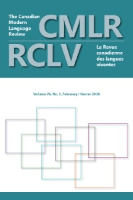
CANADIAN MODERN LANGUAGE REVIEW-REVUE CANADIENNE DES LANGUES VIVANTES
Elevating Discussions on Modern Language EducationCanadian Modern Language Review - Revue Canadienne des Langues Vivantes is a leading scholarly journal published by University of Toronto Press Inc, focused on the field of linguistics and language education. With its ISBN 0008-4506 and E-ISBN 1710-1131, this journal has established itself as a significant contributor to research in both the education and linguistics categories, currently holding a Q3 classification in Education and a Q2 in Linguistics and Language as of 2023. It boasts an impressive Scopus rank within the top percentiles for both fields, ensuring its validity and relevance among contemporary academic discourse. The journal's emphasis on publishing high-quality research aims to advance understanding and promote effective pedagogical practices, making it an essential resource for researchers, educators, and students passionate about modern languages. The Canadian Modern Language Review has been active from 1996 to 2024, facilitating discussions that bridge linguistic theory and educational practices, although it maintains a subscription-based access approach. Situated in Toronto, Canada, at the Journals Division, 5201 Dufferin St, Downsview, ON M3H 5T8, this journal invites contributions that explore innovative methodologies and critical issues in the field, fostering an environment of academic rigor and collaboration.

TESOL Journal
Fostering Dialogue in Language Acquisition and PedagogyTESOL Journal, published by Wiley, is a premier academic journal dedicated to advancing the field of Teaching English to Speakers of Other Languages (TESOL). With an esteemed reputation reflected in its high impact factor and its Q1 ranking in both Education and Linguistics and Language categories for 2023, this journal serves as a critical resource for researchers, educators, and policy-makers. It covers a wide spectrum of topics related to language acquisition, pedagogical innovations, and educational strategies in TESOL, contributing significantly to the discourse around multilingualism and effective teaching practices. The journal is notable not only for its rigorous peer-review process but also for its commitment to disseminating high-quality research that informs and inspires practice in diverse educational settings. Interested readers can access articles through traditional subscription methods, ensuring that groundbreaking research is available to a broad audience. With converged years spanning from 2010 to 2024, TESOL Journal continues to evolve, making it a vital publication for anyone interested in the complexities of language education.

Taiwan Journal of TESOL
Bridging Cultures through Language ResearchTaiwan Journal of TESOL, published by CRANE PUBL CO, serves as a vital platform for research in the fields of Education and Linguistics. Established to advance the field of Teaching English to Speakers of Other Languages, this journal provides a diverse range of scholarly articles aimed at enhancing pedagogical practices, understanding language acquisition, and facilitating cross-cultural communication. With a convergence of research years from 2017 to 2024, it proudly holds its position within the quartile rankings of Q4 in Education and Q2 in Linguistics and Language. The journal’s Scopus ranks notably place it in the 61st percentile for Language and Linguistics among Arts and Humanities, making it a respected resource for both seasoned scholars and emerging researchers. While it currently does not offer open access, the journal remains committed to making its contributions available to the academic community. The ISSN numbers are 1814-9448 and 2076-7617 for print and electronic formats, respectively, ensuring accessibility to a global audience. As a leading publication within its domain, the Taiwan Journal of TESOL invites submission of innovative research that shapes the future of language education.
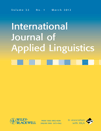
International Journal of Applied Linguistics
Bridging Gaps Between Linguistic Theory and Real-World ApplicationsInternational Journal of Applied Linguistics, published by WILEY, is a premier platform for cutting-edge research in the field of applied linguistics. With a notable Impact Factor and ranked in the top Q1 quartile of linguistics and language, this journal serves as an essential resource for scholars, practitioners, and students. The journal’s wide-ranging scope includes various subfields such as language acquisition, language education, sociolinguistics, and discourse analysis, fostering multidisciplinary approaches to language studies. It has achieved a significant Scopus Rank, placing it in the 90th percentile for both Arts and Humanities as well as Social Sciences categories, reflecting its high visibility and influence in the academic community. The International Journal of Applied Linguistics is committed to advancing the understanding of language use in real-world contexts through rigorously peer-reviewed articles that contribute to both theory and practical applications. While it is not an open-access journal, it remains a highly respected publication for researchers looking to disseminate and acquire knowledge in applied linguistics.
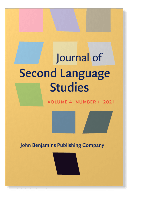
Journal of Second Language Studies
Transforming Language Learning Through Research ExcellenceWelcome to the Journal of Second Language Studies, a premier publication dedicated to advancing the field of language acquisition and pedagogy. Published by John Benjamins Publishing Co in the Netherlands, this journal (ISSN: 2542-3835, E-ISSN: 2542-3843) holds a significant place within the academic community, reflected by its Q2 ranking in Education and Q1 in Linguistics and Language for 2023. With a strong Scopus presence, ranking 197/1088 in Language and Linguistics, it appeals to a broad audience of researchers, educators, and students interested in the complexities of second language learning. The journal has been publishing groundbreaking research from 2018 to 2024, focusing on innovative methodologies, theoretical frameworks, and practical applications that enhance second language education. Although currently not open access, this journal serves as an essential resource for those seeking to deepen their understanding of language dynamics and teaching strategies in a diverse educational landscape.
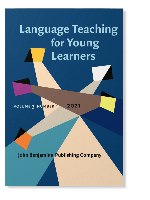
Language Teaching for Young Learners
Shaping the future of language teaching for young learners.Language Teaching for Young Learners, published by John Benjamins Publishing Co, is a premier journal dedicated to enhancing the pedagogy of language acquisition in early childhood education. Since its inception in 2019, it has rapidly established itself within the research community, reflected by its high Scopus rankings—placing it in the 85th percentile for Language and Linguistics and the 84th percentile for Education. The journal aims to provide a platform for innovative research, practical insights, and theoretical discussions surrounding the teaching of languages to young learners, thus contributing significantly to the fields of Education and Linguistics. With an open access model currently unavailable, it caters to a diverse global audience, including researchers, educators, and policy-makers, keen on improving pedagogical practices. Located in the Netherlands, the journal's commitment to academic excellence is evident through its Q1 and Q2 rankings in Linguistics and Language and Education respectively, encouraging continual discourse in cultivating effective language education practices.
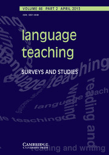
Language Teaching
Fostering dialogue on the latest trends in language education.Language Teaching, published by Cambridge University Press, is a premier peer-reviewed journal that has been at the forefront of the linguistics and language education field since its inception in 1969. With an impressive impact factor positioning it in the top tier (Q1) of its category, this journal is ranked 22nd among 1,088 in the Arts and Humanities field and maintains an outstanding 98th percentile ranking. Focusing on innovative research and methodologies in language teaching and learning, Language Teaching provides a vital platform for discussing the latest developments in pedagogy, applied linguistics, and curriculum design. Although it does not offer open access options, it reaches a broad audience of researchers, educators, and practitioners dedicated to enhancing language instruction across various contexts. The journal continues to evolve, with plans to cover emerging trends and challenges in language education until 2024, making it an essential resource for anyone invested in the teaching of languages.
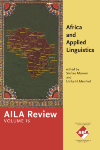
AILA Review
Unveiling insights into language acquisition and application.AILA Review, published by John Benjamins Publishing Co, stands as a pivotal resource within the field of linguistics and language studies. With an ISSN of 1461-0213 and an E-ISSN of 1570-5595, this journal is dedicated to fostering innovative research and scholarship that advances the understanding of language in its diverse forms and applications. Spanning significant years from 2003 to 2016 and 2018 to 2024, AILA Review has established itself with a commendable reputation, reflected by its Q2 ranking in Linguistics and Language and notable Scopus rankings, positioning it in the 73rd percentile among Arts and Humanities. As an essential forum for researchers, professionals, and students alike, the journal invites high-quality contributions that engage with theoretical and practical aspects of language acquisition, multilingualism, and applied linguistics, enhancing discourse in these vital areas of study. Although not an open-access journal, its commitment to quality ensures that publications are widely recognized and cited, fostering impactful scholarly exchanges.

Unterrichtspraxis-Teaching German
Elevating Language Education Through Rigorous ScholarshipUnterrichtspraxis-Teaching German is a prominent academic journal published by WILEY, dedicated to advancing the field of German language teaching and pedagogy. With its ISSN 0042-062X and E-ISSN 1756-1221, this journal serves as a vital resource for educators, researchers, and students working to improve methodologies and outcomes in the teaching of German. Although it does not currently offer Open Access options, [[the journal remains committed to high-quality scholarly contributions that foster innovative practices and theoretical advancements in language education. Based in Hoboken, NJ, the journal has established a reputation for its rigorous peer-review process and relevance across multilingual education contexts. In a world where language skills are increasingly important, Unterrichtspraxis-Teaching German plays a crucial role in promoting effective teaching strategies and contributing to the broader discourse surrounding language acquisition and pedagogy.

Argentinian Journal of Applied Linguistics
Fostering collaboration for a richer understanding of language dynamics.The Argentinian Journal of Applied Linguistics is a prominent publication dedicated to advancing the field of linguistics with a particular focus on practical applications within various contexts. Published by the Federación Argentina de Asociaciones Profesionales de Profesores de Inglés (FAAP), this journal serves as a vital platform for researchers, educators, and linguistics professionals interested in the nuances of language teaching, acquisition, and sociolinguistics. With an ISSN of 2314-3576, the journal showcases original research and reviews that push the boundaries of current knowledge and practice in applied linguistics. Despite being in its early stages, the journal aims to build a strong academic presence by fostering collaboration among scholars and practitioners, thereby contributing to the enhancement of language education in Argentina and beyond. The importance of this journal lies not only in its commitment to accessibility and knowledge dissemination but also in its role as a bridge between linguistic theory and practical application, ultimately benefiting educators and learners alike.